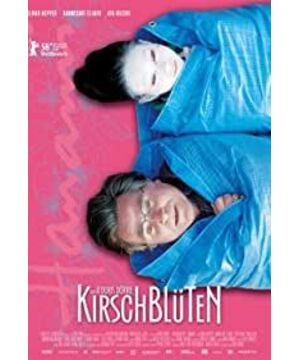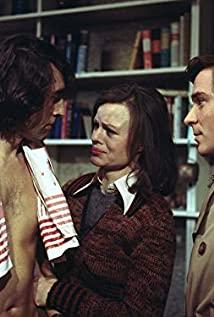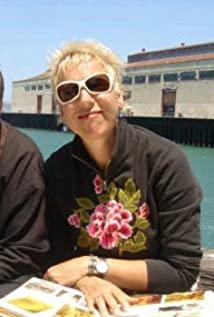"Cherry Blossoms", a movie I watched in Sichuan University Nanyuan some time ago. In the afternoon of that day, the sun was scorching hot, and I walked on the streets of Chengdu with my old classmates, and then sat on the hot roof. Sitting on the top of the building, like a frog at the bottom of a well, I looked around and found that: the low houses all around could only give a frightened nod, while the tall houses generously revealed their grub collars, round chests and slender waists. Just like people, a house needs to be rich and powerful.
Before that, I was watching this tribute to Ozu by German director Doris Drrie.
What do you mean, the cherry blossoms are in full bloom? Brilliant and short life? The mania of young men and women? Youthful stubbornness for no reason? I looked down slowly, questioning at the same time.
Halfway through the film, it seems to be completely imitating Ozu's "Tokyo Story". The old wife (Truti) learned that her husband (Rudy) was terminally ill, and planned to hide the illness and go with her husband to visit their children who live and work in various places. The children's response was indifferent, as if there were countless days and nights of getting along with each other in the future, and all they had to do now was to complain about the arrival of their parents and the various troubles caused by it.
Is this a bad parody?
Turnaround. In the second half of the movie, the old wife died suddenly before her husband. This plot is completely beyond the imagination that "Tokyo Story" can give people. The speculative characteristics of the Germans gradually emerged. The father in "Tokyo Story" hides his pain deeply and deeply, and his polite attitude towards a few indifferent children is even more heartbreaking. This is what Zhu Dake called "Asia's pain relief mode". It doesn't let you face and question the pain directly, but put it aside, as if the pain never came (such as Zhuangzi drumming the basin and singing "Wei"). wife died). The old German man did not shy away from shedding his tears in front of his relatives, nor did he forbear the loneliness brought about by the quietness of the room at night. When the light was not on, he said, "I have a lot of things to do. I am remembering, remembering your mother."
In the endless painful memories, the grieving old man finally got something. He realized that his wife's life was completely devoted to her husband and family, and he even gave up his dream of being a dance performer when he was young. He has to pay back.
With grief, and seeing enough of the faces of several children who stayed in German cities, more importantly, in order to fulfill the old wife's long-cherished wish to visit Japan, the old man came to Japan with his old wife's clothes. In Japan, there is their most beloved young son. But what the old man got was not the company of enthusiasm, but the indifference and busyness of youth.
The old man had to travel around Tokyo's attractions alone. But more precisely, not one person, but two people. Because he was wearing his old wife's green sweater and long skirt under his coat. In his heart, this dress is the soul of his wife. He wants what he likes to be seen by his wife, and he wants what he likes to be liked by his wife. At this time, the materialist will of course say: "Old man, you are superstitious". Why doesn't the old man know that his wife's clothes and his wife are two different things. Didn't he also ask this question -
"Where is Trudy? Where is
her body?
The memory she left me is in my body, but if I'm not there, she will be there Where?"
Unfortunately, there are very few thorough materialists in this world, because only their hearts are strong enough to go through all the pain. And we ordinary people, too fragile, must believe in some "nothing" and let this "nothing" bear a part of the pain that we cannot bear. If the old man doesn't believe that the piece of clothing connects the soul of the old wife, isn't the world too big, space, and quiet for him?
However, the old man really touched the soul of the old wife after he came into contact with the Japanese dance art. In a park with cherry blossoms in full bloom, a dance performer dances with the hands and feet of the crowd. This is a homeless girl who lost her mother, living in a makeshift tent. I come to the park every day and dance under the cherry tree to miss my mother. The old man watched it every day, and gradually became imitated. When he learned the girl's gestures and tried to feel the wind, memory and love with his clumsy five fingers, I seemed to feel a kind of happy growth as brilliant as cherry blossoms.
"The cherry blossoms are in full bloom", does it mean that a person feels happiness in the memory? So, can the old man be happy all his life? Such an ending seems to lack the imagination that art should have.
So, I have been speculating about what the old man should do next? How will his future director be designed? Therefore, when the director put the death rope on the old man, I felt lost and felt that it must be the case.
He died under Mount Fuji. Mount Fuji was his wife's dream place to go. Finally, after many days of fog, the old man put on his wife's dance performance costume when he was young, put on a thick foundation, and came to the lakeside under Mount Fuji. It's a disgusting outfit. The old man danced lightly, the dance was clumsy but full of affection. It seemed that at that moment, it was no longer a single person who danced, but the old couple performing the final dance together. In this early morning with no audience, they made eye contact and experienced it with their movements. Parting love is a pain that the world cannot escape and cannot bear. I hope that this moment can stay longer. The old man must be looking forward to it as much as I do.
As expected, he and his wife really never parted. Because, he died, at the end of the dance.
What is Cherry Blossom: At the best of times, they die together, falling together like cherry blossoms in full bloom.
the sky is black in october the sky is black in
november
View more about Kirschblüten - Hanami reviews











